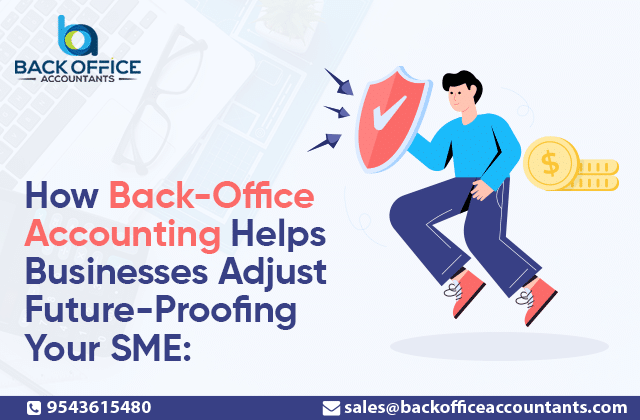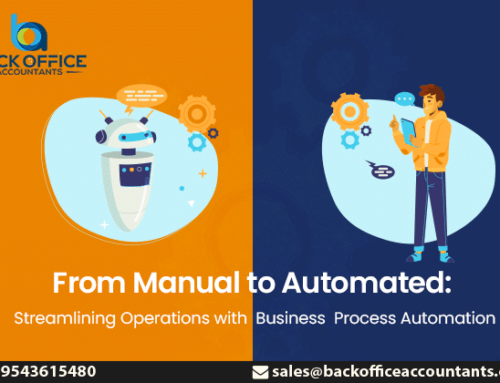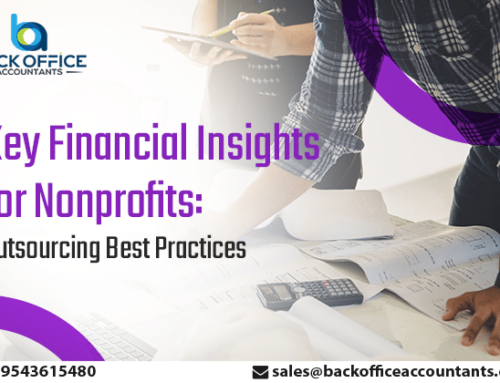To combat rising costs, falling revenues, or increased competition, routine evaluation of finances by a dedicated team practising sound accounting practices is a sure and reliable remedy. Financial health, together with strategy innovation should be the very first priority for SMEs.
Correct management of accounting procedures in the back office now stands as an essential component in achieving this aim. This way, SMEs will be able to secure today’s activities while building the foundations for effective management in the future.
The Role of Back-Office Accounting in Financial Management for SMEs
1. Insights on financial health
Back-office accounting for SMEs goes beyond mere record-keeping: It spans accounting, accounts receivable and accounts payable, financial statements, tax compliance and more. In a business, the accuracy and efficiency of back-office procedures are highly important.
Such activities provide insight into a company’s financial health, which has an important bearing on capital raised outside the company. So long as a company keeps careful records combined with timely statements, policies can trace proven ways from process analysis and pursue an innovative course for financial management for SMEs.
2. Long-term goals
In addition, such a clear financial picture supports not only day-to-day operations but also gives way to long-term goals. By coming to terms with the economic environment around them, SMEs can make judicious choices about whether to expand or contract.
3. Legal requirements
Furthermore, this also makes sure that legal requirements and regulations are met. If a company behaves unreasonably, governmental laws can crush it by imposing fines. It will also lose all credibility at a stroke even with its customer base or competitors because non-compliant behaviour damages both reputation and goodwill.
For a small business, it is quite practical to implement the measures necessary to prevent these risks. A trustworthy back-office group can reduce these risks by aligning financial operations with industry standards.
Small Business Accounting Strategies for Future Growth
1. Technology
Properly preparing small businesses for the future involves coming up with financial strategies in a different form beforehand. Cloud-based accounting software is an excellent example of this kind of strategy.
It consolidates data management, increases accuracy and brings into view real-time industry trends and other macroeconomic indicators that once weren’t available to individuals or small businesses without spending millions. Harnessing this technology enables SMEs to react rapidly to shifts in the market and provides a solid basis for all future decision-making.
2. Cash flow management
Another way is to control your cash flow. Cash flow for SMEs is the life of a company. Can we still improve our operations if payments start to slip or unforeseen events interfere with the business? Back office support for small enterprises should include timely invoicing, conscientious after-sales service, and proper cash flow prediction–so that financial disasters are avoided.
3. Forecasting
Forecasting is another area where small business accounting strategies are outperforming themselves. Through the analysis of historical data and attention to current trends among competitors, back-office accounting can help SMEs project their future receipts and expenditures. With this knowledge in hand, businesses can have realistic aims, prepare for lean seasons and capitalise on growth opportunities.
The Importance of Improving Cash Flow for SMEs
It is important for the sustainability of any SME, whether big or small, to manage its cash flow properly. Many small-scale businesses fail because of a lack of profit because of poorly organised systems to detect exactly where profits are going. This points out the importance of having a special back-office accounting system to manage and optimise your cash flow.
1. Profitability
Always having a good cash flow in the company shortens the time before businesses can be profitable. To achieve this, back-office teams put in place systematic processes for tracking receivables, paying payables and keeping the balance between income and outgoings under control for a long period.
2. External funding
For SMEs looking to expand, strengthening cash flow also simplifies the path towards securing external funding. Lenders and investors are more likely to support companies with clear, organised financial operations. If the company has a recent history of stable cash flows, it will also be looked upon positively by everyone including the lenders. By showing financial discipline on their part, SMEs can acquire greater trust and more of what they need for growth purposes.
Adapting to Uncertainty with Back-Office Support
Business is filled with uncertainties, and small and medium-sized enterprises are often particularly challenged due to their scale of operation. Back-office accounting systems furnished with good tools and insights should be adjusted from time to time according to changing circumstances.
SMEs can respond quickly when equipped with a sound back office: in the face of an economic downturn, supply chain interruption or change in consumer demand, it helps. It also provides a reliable basis for decision-making.
Final Overview
Back office Accountants are dedicated to supporting SMEs to grow with comprehensive back-office solutions that drive efficiency and shape the future. Whether it’s improving cash flow, optimising accounting strategies, or ensuring compliance, their expert team helps small businesses build a strong financial history for tomorrow! Through the help of professional back-office accounting services, today’s growing SME can handle every challenge and get ready at once.







